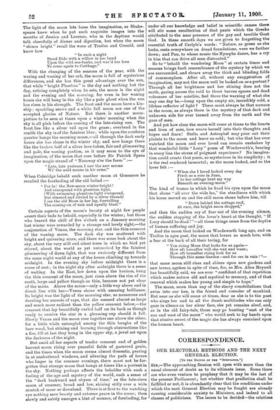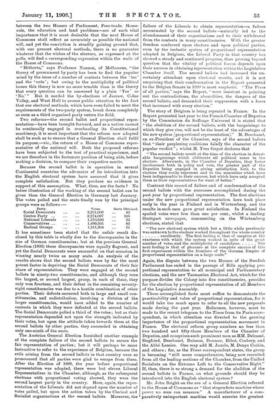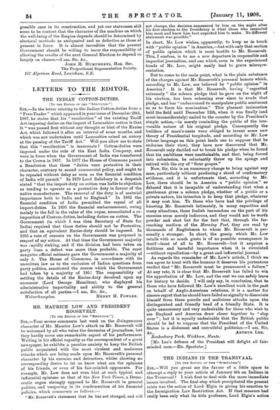CORRESPONDENCE.
OUR ELECTORAL METHODS AND THE NEXT GENERAL ELECTION.
[TO THE EDITOR OF THE "SPECTATOR.1
Si,—The approaching Session will open with more than the usual element of doubt as to its ultimate issue. Some there are who even venture to prophesy that it may be the last of the present Parliament ; but whether that prediction shall be fulfilled or not, it is abundantly clear that the conditions under which the next General Election may be fought are already causing considerable anxiety to Ministers, and indeed to all classes of politicians. The issues to. be decided—the relations
between the two Houses of Parliament, Free-trade, Home. rule, the education and land problems—are of such vital importance that it is most desirable that the next House of -Commons. shall reflect as accurately as possible the national will, and yet the conviction is steadily gaining ground that, with our present electoral methods, there is no guarantee whatever that the wishes of the electors, as expressed at the polls, will find a corresponding expression within the walls of the House of Commons.
"Hitherto," says Professor Nanson, of Melbourne, "the theory of government by party has been to find the popular mind by the issue of a number of contests between the ' ins ' and the outs '; but owing to the multiplicity of political issues this theory is now no more tenable than is the theory that every question can be answered by a plain 'Yes' or No.'" But it needed the by-elections of Jarrow, Colne Valley, and West Hull to arouse public attention to the fact that our electoral methods, which have even failed to meet the requirements of the two-party system, break down completely as soon as a third organised party enters the field.
Two reforms—the second ballot and proportional repre- sentation—have been brought forward, and as a nation cannot be continually engaged in overhauling its Constitutional -machinery, it is most important that the reform now adopted shall be such as to ensure that a General Election shall fulfil its purpose,—viz., the return of a House of Commons repre- sentative of the national will. Both the proposed reforms have been subjected to the test of practical experience, and we are therefore in the fortunate position of being able, before making a decision, to compare their respective merits.
Because the second ballot is in operation in several Continental countries the advocates of its introduction into the English electoral system have assumed that it gives complete satisfaction. But they produce no evidence in support of this assumption. What, then, are the facts ? No better illustration of the working of the second ballot can be given than the General Election in Germany last January. The votes polled and the seats finally won by the principal groups were as follows :— Party. Social Democrats Centre Party ... National Liberals Conservatives ... Radical Groups It has sometimes been stated that the . unfair result dis- closed by this table is wholly due to the discrepancies in the size of German constituencies ; but at the previous General Election (1903) these discrepancies were equally flagrant, and yet the Social Democrats were successful on that occasion in winning nearly twice as many seats. An analysis of the results shows that the second ballots were by far the most potent factor in depriving the Social Democrats of their fair share of representation. They were engaged at the second ballots in ninety-two constituencies, and although they were the largest, or second largest, group, in each of these, they only won fourteen, and their defeat in the remaining seventy- eight constituencies was due to a hostile combination of other parties. Their defeats occurred both in large and small con- stituencies, and redistribution, involving a division of the larger constituencies, would have added to the number of contests in which they were defeated at the second ballots. The Social Democrats polled a third of the votes ; but as their representation depended not upon the strength indicated by their votes, but upon the attitude taken towards them at the second ballots by other parties, they succeeded in obtaining only one-ninth of the seats.
The Austrian General Election furnished another example of the complete failure of the second ballots to secure the fair representation of parties ; but it will perhaps be more instructive to refer to the experience of Belgium, because the evils arising from the second ballots in that country were so pronounced that all parties were glad to escape from them. After the Election of 1898, the year before proportional representation was adopted, there were but eleven Liberal Representatives in the Chamber, although, as the subsequent elections with proportional voting showed, they were the second largest party in the country. Here, again, the repre- sentation of the Liberals did not depend upon the number of votes polled, but upon the action taken by the Clerical and Socialist 'organisations at the second ballots. Moreover, the
Votes. 3,251,009 2,274,097 1,570,836 1,499,501 1,211,304 Seats Obtained.
... 43 ... 105 • 55 • 83 • 51
failure of the Liberals to obtain representation—a failure accentuated by the second ballots—naturally led to the abandonment of their organisations and to their withdrawal from the contests in many constituencies. With the greater freedom conferred upon electors and upon political parties, even by the inelastic system of proportional representation adopted in Belgium, the Liberal Party in that country has showed a steady and continued progress, thus proving beyond question that the vitality of political forces depends upon their success in obtaining representation within the Legislative Chamber itself. The second ballots had increased the un- certainty attendant upon electoral results, and it is not surprising that their condemnation in the Report presented to the Belgian Senate in 1899 is most emphatic. "The Press of all parties," says the Report, "were insistent in pointing out the contradictions, the absurdities, the dangers of the second ballots, and demanded their suppression with a force that increased with every election."
The story of Belgium is being repeated in France. In the Report presented last year to the French Chamber of Deputies by the Commission du Suffrage Universel it is stated that "the abolition of the second ballots, with the bargainings to which they give rise, will not be the least of the advantages of the new system [proportional representation]." M. Deschanel, an ex-President of the Chamber, says of the second ballots that "their perplexing coalitions falsify the character of the popular verdict"; whilst M. Yves Guyot declares that
"The second ballots result at the time of the election in detest- able bargainings which obliterate all political sense in the electors. Afterwards, in the Chamber of Deputies, they foster incoherence both in policy and vote, the greater part of the Deputies being engaged in giving satisfaction both to the electors they really represent and to the minorities which have been indispensable to their success, but which have only accepted them as their representatives for want of better."
Contrast this record of failure and of condemnation of the second ballots with the successes accomplished . during the past year by proportional representation. The first elections under the new proportional representation laws took place early in the year in Finland and in Wiirtemberg, and the results in each case gave great satisfaction. In Finland the spoiled votes were less than one per cent., whilst a leading Stuttgart newspaper, commenting on the Wiirtemberg elections, stated that
"The new electoral system which but a little while previously was unknown to the electors worked throughout the whole country excellently. The first feeling is that of surprise at the exactness with which the system worked in spite of the great number of votes and the multiplicity of candidates The next feeling is that of pleasure at the complete success of this first experiment within the frontiers of the German Empire of proportional representation on a large scale."
Again, the dispute between the two Houses of the Swedish Parliament has ended in the passage of Bills applying pro- portional representation to all municipal and Parliamentary elections, and the new Tasmanian Electoral Act, which for the purpose divides the Colony into five constituencies, provides for the election by proportional representation of all Members of the Legislative Assembly.
These accomplished facts must suffice to demonstrate the practicability and value of proportional representation, for it would take too much space to refer to all the new proposals made during the past year. Reference, however, must be made to the recent telegram to the Times from its Paris corre- spondent, in which attention was directed to the growing importance of the proportional representation movement in France. The electoral reform group numbers no less than two hundred and fifty-three Members of the Chamber of Deputies, and comprises such prominent men as MM. Delcasse, Siegfried, Descbanel, Buisson, Doumer, Ribot, Cochery, and the Abbe Lemire. One may add M. Jaures, M. Denys Cochin, and others ; for, as the Times correspondent states, the group is becoming "still more comprehensive, being now recruited from all the leading sections of the Chamber, from the Unified Socialists on the Extreme Left to the Conservative Right." If, then, there is so strong a demand for the abolition of the second ballots in France, on what grounds should they be introduced into the English electoral system ?
Mr. John Bright on the eve of a General Election referred to" the House of Commons as "that stupendous machine whose power no man can measure." A manufacturer of a com- paratively unimportant machine would exercise the greatest poesihle care in its construction, and yet our statesmen still seem to be content that the character of the machine on which the well-being of the Empire depends should be determined by electoral methods as antiquated and as defective as those at present in force. It is almost incredible that the present /Government should be willing to incur the responsibility of allowing the results of the next General Election to depend so largely on chance.—I am, Sir, &c.,
Jolibr H. HUMPHREYS, Hon. Sec. The Proportional Representation Society. 107 Algernon Road, Lewisham, S.E.












































 Previous page
Previous page